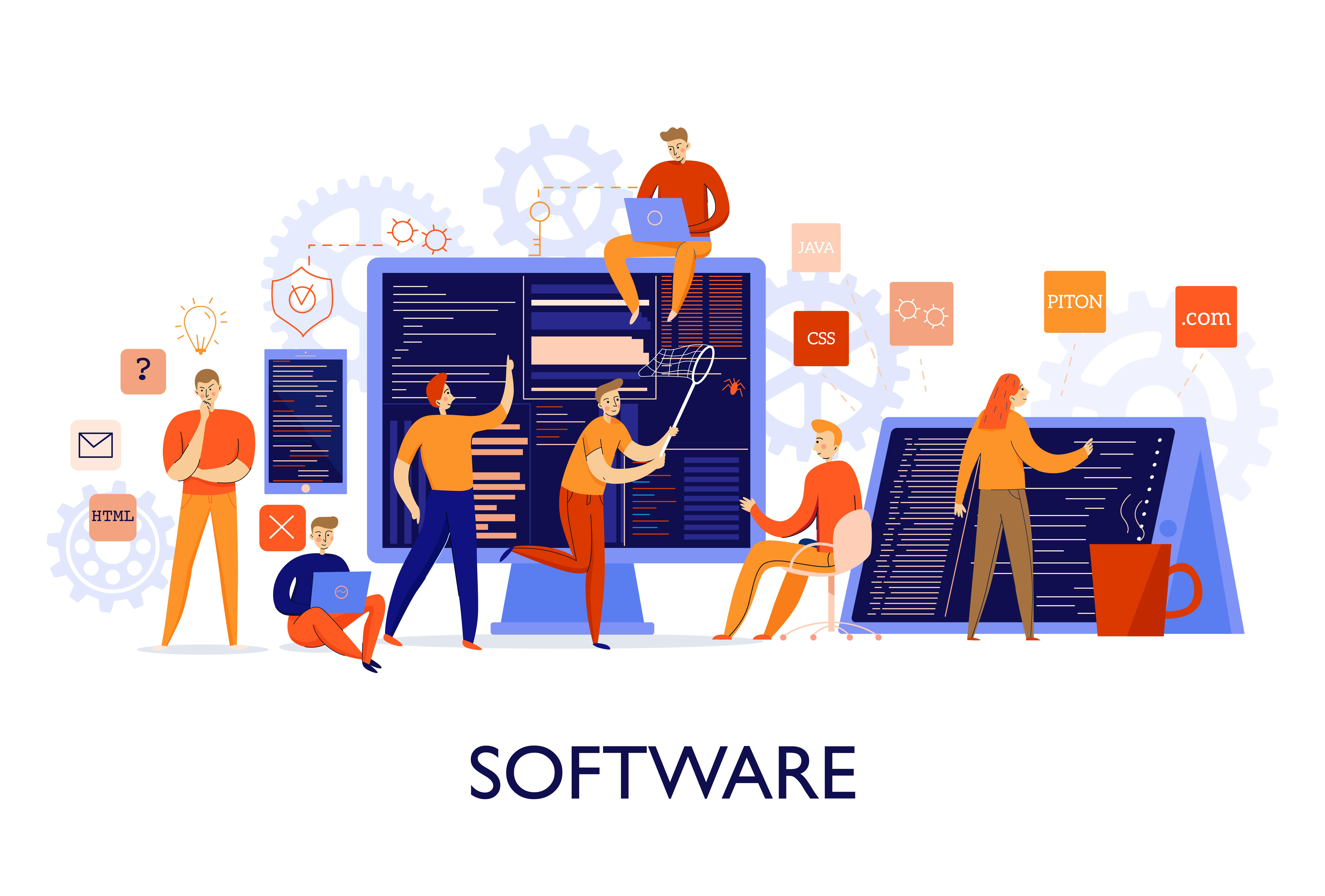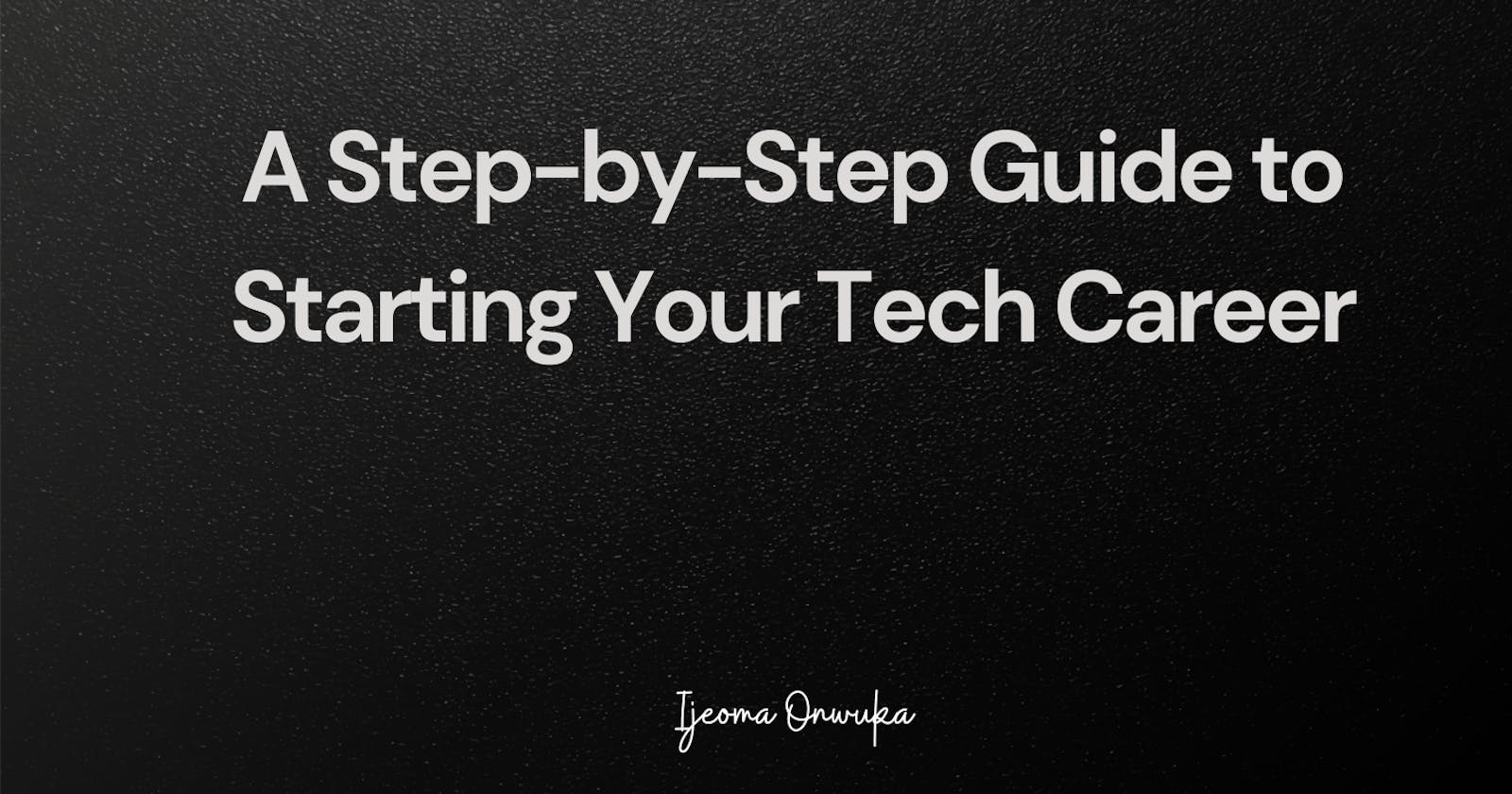A Step-by-Step Guide to Starting Your Tech Career
How to Get Started in Tech in 2024
You may have various reasons why you want to get into tech. Is it the thrill of landing that dream job, turning a lifelong techy dream into reality, avoiding the dreaded couch-surfing saga, or perhaps succumbing to the ever-persistent peer pressure?
Getting started in tech is no longer what it used to be four to five years ago, and with the current job market, it’s a lot more difficult to break in as a beginner. But that doesn’t mean it’s impossible. You just need to show up consistently, bring your A-game, put in the work, and take it one step at a time.
So, are you thinking of making a career switch to technology with little to no experience? Fret not! This article is for you.
In this article, we will cover the necessary steps that can help you start your tech career.
Do Your Research

Before diving into tech, you need to discover the various career paths and opportunities in tech. You need to understand the tech industry's current trends and demands. It is ever-evolving. In the last five years, there were some career paths in tech that were still upcoming, but now they have become one of the most sought-after.
Oftentimes, people reach out to me and say they want to get started in tech but don't know where to start. I always tell them to go and do their research. And the majority would come back and say, I should tell them what career path they should take.
This is one of the most important steps; in fact, it is a must-take, and you need to do it yourself. You need to figure out what suits you best. This foundational research will not only guide your initial steps but also empower you to make informed decisions throughout your journey.
I won't attempt to cover every tech career path—I'll keep it simple for beginners. I'm focusing on the key roles that are always in demand by tech companies. These roles are crucial; they offer a solid starting salary, provide skills you can use elsewhere, and open up opportunities for career growth.
Here are some major areas you can start researching:
After going through some of the major areas I listed above, you now have some knowledge about different roles and what they do.
Ask yourself: Which role aligns with your personality, dreams, and aspirations? What business challenges do you enjoy tackling? What kind of work ignites your passion every day? This guide aims to provide you with enough insights to start narrowing down possibilities, allowing you to focus more on the opportunities that resonate with you.
Pick a Niche

“The key to choosing a career that’s right for you is to select one that you’ll love for many years to come.”
Now that you have researched the various roles in tech, it's time to decide which resonates with you. Imagine you've come across product design but feel uncertain about your knack for colours. On the other hand, community management sparks excitement because you've always enjoyed organizing events and managing people. Maybe a tech-savvy friend praised the perks of being a web developer, leaving you impressed but torn because they all sound appealing.
Consider your existing skills—ones you can seamlessly transfer into the tech world. Let's say you have a passion for writing. Your understanding of how to write could make digital marketing, content writing, and technical writing a natural fit. The idea is to bridge your current skills or hobbies with your potential tech career.
Remember, choosing a tech path now doesn't lock you in forever. Just as I started as a product manager and transitioned to community management, your journey might evolve too. Starting as a technical writer doesn't mean you can't later pivot to developer advocacy. So dip your toes in, explore, and allow your path to unfold naturally.
Find Resources and Tools

Now that you have decided on the career path you want to pursue, the next step is equipping yourself with the right resources and tools. Google is your friend. You can always find any resources you need to start learning, both free and paid, on Google. All you need to do is search.
Start by exploring online platforms that offer courses, tutorials, and hands-on experiences tailored to your chosen niche. I always recommend starting with free courses first to build foundational knowledge around the path you have chosen before going for paid resources.
For example, platforms like FreeCodeCamp, HubSpot, Codecademy, Udacity, or Coursera act as your tech supply store, providing a variety of resources to enhance your skills. Identify coding environments (VS Code, Sublime Text, PyCharm, etc.), programming languages, and frameworks that align with your chosen niche. If you have chosen career paths like product management, digital marketing, or social media management, search on Google for the various tools you need and start learning how to use them.
As you are trying to gather resources and tools for your learning, take your time to pick out the resources that resonate with you and gradually build your collection. Finding a resource isn't the challenge; picking the right one is key.
To choose, think about how you like to learn—reading or watching videos. Pick a resource with a structured plan that teaches the necessary skills step by step. Ask questions, read reviews, and do a quick test to ensure it suits your learning style. Choosing the right resource is crucial; it makes learning enjoyable and keeps you from giving up easily.
Start Learning

You've chosen your desired tech career path and armed yourself with the right resources and tools to get started. Congratulations! That’s your first big step. It's time to dive into the exciting phase of starting your learning journey.
Begin by creating a study plan, breaking down tasks and assignments into manageable chunks, and taking it one step at a time every day. This approach lets you grasp the fundamental concepts before moving on to the more complex aspects without getting overwhelmed. This will also help you avoid clashes in your schedule, as you’ll have a clear view of what lies ahead, week by week.
Create a schedule that suits your lifestyle, ensuring you allocate dedicated periods for your learning. Whether it's an hour each day or a few concentrated sessions per week, the key is to maintain a steady pace.
Try to set goals and finish them before jumping to another one. Start a course and finish it before jumping to another course or resource. It’s best to complete one task before jumping to another. If that is not possible, try to leave it at a good stopping point, with some good notes if necessary.
Celebrate your accomplishments, no matter how small, and use them as motivation to propel you further.
Join Communities and Build Relationships

Joining tech communities is one of the best ways to stay informed about the latest trends, connect with other beginners and professionals, and stay up-to-date on the latest career opportunities.
As a beginner, it's not just about learning in isolation; it's about becoming part of a dynamic network that propels your journey forward. By actively participating in online communities, attending meetups, and engaging with professionals and enthusiasts, you get the opportunity to build relationships that can be catalysts for growth.
In these communities, you're not merely a spectator; you're a contributor. Share your experiences, ask questions, and offer assistance. It's a two-way street, much like a friendly neighbourhood where everyone benefits from each other's knowledge.
Here are some online communities you can join:
It’s not just about joining communities; it's about strategically aligning with those that match your professional goals. By actively participating in communities that value collaboration and growth, you become more than a member; you become a contributor to a shared vision.
Build Projects

Once you have good foundational knowledge, start practising what you have learned by building basic projects.
As a web developer, imagine building a personal website from scratch, incorporating responsive design and interactive features. This hands-on project not only solidifies your coding skills but also serves as a tangible showcase of your abilities to potential employers.
If you are a digital marketer, consider creating a comprehensive online campaign for a hypothetical product. This could involve designing engaging social media content, optimizing website SEO, and analyzing campaign performance. Such a project not only hones your digital marketing skills but also provides measurable outcomes, showcasing your ability to drive results in the online landscape.
For writing enthusiasts, consider building a portfolio blog where you publish articles or creative pieces regularly. You can use Medium, Hashnode, or Substack for your blog. This project not only refines your writing skills but also demonstrates your consistency and ability to engage an audience. It becomes a living portfolio, showcasing your unique voice and expertise.
The same thing applies to whatever career path you have chosen. Building projects is one of the best ways to learn, and these projects serve as more than just learning exercises—they become tangible proof of your capabilities and a valuable asset as you navigate your chosen tech field.
Document Your Progress

It can be challenging to know if you are making progress or not when learning something new. The first piece of that puzzle is documenting what you are working on or learning.
Documenting your progress is like keeping a detailed journal of your journey—a record that not only showcases your growth but also becomes a roadmap for future endeavors. Imagine putting together a folder or a journal where you write about the projects you've worked on and the new skills you've learned. This record becomes a clear way to show what you've achieved and where you're heading in your tech career
Documenting your progress means writing down as often and consistently as possible:
Progress on projects
New project ideas
What you're thinking
What you're feeling
What you're worried about
Sometimes, you can only see how far you have come through documentation. Those small and not-so-many tasks, write them out. If you do it consistently and check the data, you will see how far you have come and the challenges you have conquered.
Leverage Social Media and Build Your Personal Brand

After learning a new skill, your goal is to earn with it in whatever way possible. How can people employ you if they don’t know you or can’t even catch a glimpse of you on social media? When it comes to leveraging social media and building a personal brand, think of it as crafting your online identity—your public image.
Start by choosing the right platforms for you, whether it's LinkedIn, Twitter, or others, and use them consistently to share your insights, projects, achievements, and thoughts and engage in conversations with others in the field. LinkedIn, after all, is the new resume. Be sure that your LinkedIn profile is optimized and full of search terms relevant to your new career, including a link to your portfolio if it exists.
Building a personal brand involves presenting yourself authentically. Imagine your personal brand as a reputation that precedes you. Whether you're a coder, designer, or enthusiast, your online presence becomes a testament to your skills and passion.
Attend Events and Conferences

Attending events and conferences is one of the best ways to network and connect with professionals in your field. Networking may not be your favourite thing to do, but it’s a means to an end. And the best time to start building connections is before you need them.
Engaging in events and conferences isn't just about passive observation; it's an opportunity to actively participate, ask questions, join discussions, and connect with individuals who share your passion.
Consider attending these events as a way to immerse yourself in the ever-evolving tech ecosystem. By participating in these gatherings, you not only expand your understanding of the tech world but also position yourself at the forefront of innovation and collaboration.
If you are on the lookout for tech events and conferences, join some of the communities I mentioned above. The majority of them host annual conferences and online events.
Stay Consistent

“If you stick with it and don’t give up, you will find a job. You will get your foot in the door. If you’re not sure, trust your gut. Keep pushing until it happens.” _Kara Bressie
This is the most important step in starting a career in tech, and arguably the most difficult. Without consistency, you are probably not gonna make it. You feel me?😉
Think of consistency as a committed workout routine. Whether you're dedicating a fixed amount of time each day or specific days of the week to your tech endeavors, it's about creating a routine that becomes a natural part of your schedule. Like any habit, the more consistent you are, the more effective and sustainable your progress becomes.
Picture your tech journey as a series of small, manageable steps. Consistency is about steadily taking these steps, no matter how small, toward your goals.
Have a Side Hustle

Getting into tech and landing a job isn't easy; it might take a while. So, it's crucial to have something on the side while you try. This is often not talked about, but it's important.
If you already have a regular job, don't quit it to dive into tech right away. You need something to support you while you're trying to break into the tech world. Think of having a side hustle as a safety net—it keeps you stable financially.
It could be freelancing or a small business—something that brings in extra money and lets you focus on tech without stressing about finances. Having a side hustle is like having a backup plan, making sure you can handle the ups and downs of breaking into tech while staying financially secure.
Conclusion
Starting a career in tech demands a thoughtful and strategic approach. From choosing a niche to building projects, documenting progress, and engaging with the tech community, each step contributes to your growth.
Remember, the path to a tech career may not always be straightforward, and having a side hustle is a practical safeguard during this transition. Staying consistent, attending events, and leveraging social media add layers to your journey, ensuring a well-rounded and enriching experience.
In the tech world, where things are always changing, facing challenges, being flexible, and having a strong mindset are important. As you step into this exciting world, remember that your journey is special, and each little step you take gets you closer to the tech career you aspire to achieve. Keep learning, stay consistent, and have fun on this ever-changing adventure that is your tech journey.
I wish you all the best!
Ciao!✌️
